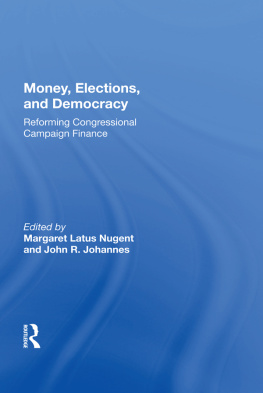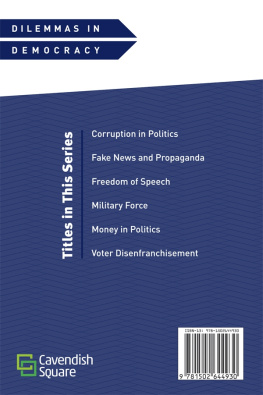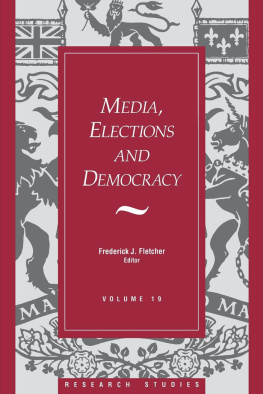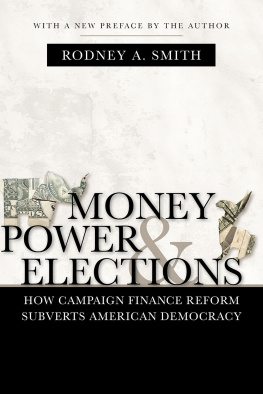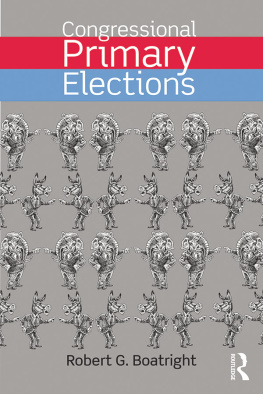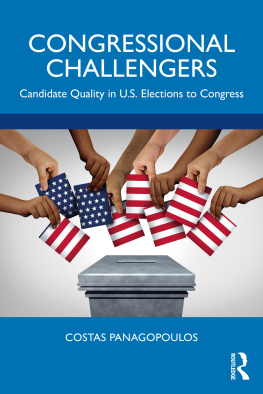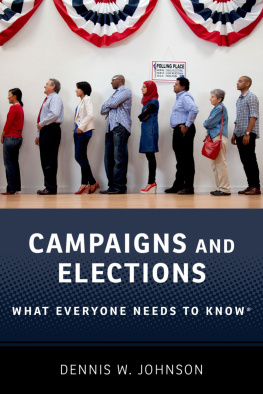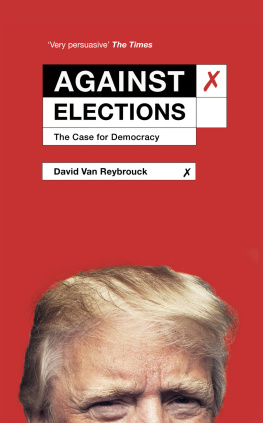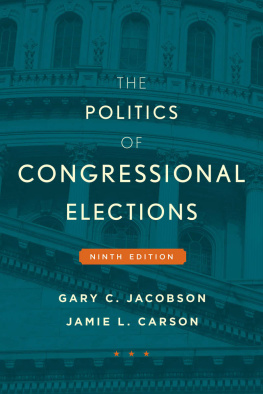First published 1990 by Westview Press
Published 2018 by Routledge
52 Vanderbilt Avenue, New York, NY 10017
2 Park Square, Milton Park, Abingdon, Oxon OX14 4RN
Routledge is an imprint of the Taylor & Francis Group, an informa business
Copyright 1990 by Taylor & Francis
All rights reserved. No part of this book may be reprinted or reproduced or utilised in any form or by any electronic, mechanical, or other means, now known or hereafter invented, including photocopying and recording, or in any information storage or retrieval system, without permission in writing from the publishers.
Notice:
Product or corporate names may be trademarks or registered trademarks, and are used only for identification and explanation without intent to infringe.
Library of Congress Cataloging-in-Publication Data
Money, elections, and democracy : reforming congressional campaign
finance / edited by Margaret Latus Nugent and John R. Johannes.
p.cm.
ISBN 0-8133-7891-5
1. Campaign fundsUnited States. I. Nugent, Margaret Latus,
1958.II. Johannes, John R., 1943
JK199l.M75 1990
324.780973dc20
90-30294
CIP
ISBN 13: 978-0-367-01436-0 (hbk)
We are deeply indebted to the Bradley Institute for Democracy and Public Values of Marquette University for its support of this book. The insights of Leon D. Epstein, Linda Fowler, Benjamin Ginsberg, Stephen E. Gottlieb, Brooks Jackson, Gary Jacobson, Michael J. Malbin, Susan Manes, Ellen S. Miller, Daniel J. Swillinger, and John C. Wright were invaluable in formulating our conclusions. The Institutes Director, Thomas E. Hachey, and our spouses, Frances S. Johannes and James A. Nugent, provided technical and personal support for this project. Finally, Dawn Crowley, Catherine Mitchell, and Audra Schmidkonz assisted with many details. John C. Horgan masterfully prepared the manuscript for publication, and Susan Spoerk and Norman N. Gill assisted with proofreading.
Margaret Latus Nugent
John R. Johannes
1
Introduction: What Is at Stake?
Margaret Latus Nugent and John R. Johannes
Too much money is being given by special interest PACs. Too much money is being spent by candidates. Too much influence is being exercised through political money. The scandalous way in which congressional campaigns are financed is threatening our representative system of governmenta government of, by and for the people.
Free and fair elections, it seems, are prescriptions the U.S. urges upon others. In this country, however, the system is deliberately rigged to favor those already in power. And glaring campaign-finance loopholes are further stretched enough to accommodate even Boss Tweed.
When politicians start to see a dollar sign behind every vote, every phone call, every solicitation, those other factors sometimes weighed during governance, like the public good and equal access to government, become less and less important.
When 99.2 percent of all incumbents get re-elected, many of them without opposition, there is more than the PAC issue at stake. Democracy is at stake.
The ink on the post-Watergate campaign finance reforms was barely dry when challenges to the new laws arose, loopholes opened, and calls for new and better reforms sounded. Lacking a campaign finance scandal of the scope of Teapot Dome or Watergate, the Eighties might well be characterized as a pre-malignant era with hints of corruption, widening loopholes, and compounding criticisms of common campaign finance practices. Reform proposals multiplied in response to concern that a scandal was threatening and needed to be averted.
Even a very brief survey of criticisms of congressional campaign finance in the 1980s highlights these concerns among journalists, political activists, and legislators. Elizabeth Drew claims that politicians are being driven to new forms of corruption, are
Throughout the 1980s, books, newspaper articles, and popular news magazines increasingly have been charging that current practices in financing congressional elections: (a) reduce competition, guaranteeing the re-election of incumbents; (b) nationalize political influence, undermining the local ties of representatives; (c) weaken the political parties, contributing to the Balkanization and polarization of Congress; (d) promote legislative corruption and fundraising fraud; and (e) perpetuate numerous other abuses and loopholes that violate the spirit of the Federal Election Campaign Act. For example, a single issue of U.S. News and World Report contained articles on campaign financing entitled: A Case of Legal Corruption, What Dollars Can Buy, and The Dirty Big Secret of Campaign Finance.
The media are not alone in their concerns. For over twenty years, Common Cause, the self-styled citizens lobby, has pushed for campaign finance reform. More recently, it has been joined in its efforts by other think tanks and interest groups such as Democracy Project, The Center for Responsive Politics, and Citizens Against PACs. Members of Congress have joined the attack. A survey of members of Congress in 1987 indicated that almost half admitted that fundraising duties cut into the time they devote to legislative work. Forty-three percent said that PACs have had a negative or somewhat negative effect on the operations of Congress. At least one-third were concerned that the current campaign finance system makes representatives less inclined to compromise on legislative issues. One Member claimed that incumbents are responsible for extorting money from PACs. Another complained that PACs and interest group contributions have led to the Balkanization into separate little power fiefdoms. Not surprisingly, Congress has responded with reams of legislation on campaign financing.
Campaign Finance Reforms in the Progressive Tradition
Concerns about campaign financing are not new in American have led to changes in our campaign finance system that were designed to achieve a series of goals: (1) Oppose the influence of money on the behavior of those elected; (2) assure that narrow interests do not prevail over the public good; (3) prohibit money from distorting the integrity of elections; (4) prevent the unequal distribution of wealth from undermining political equality; and (5) require open government that precludes secrecy in raising and spending campaign funds.
The first federal laws of this century focused on the potential for campaign funds to corrupt the activities of government. The Tillman Act of 1907 was passed in response to allegations that contributions to Teddy Roosevelts 1904 presidential campaign were given in exchange for protection from trust busting. The Tillman Acts restriction on corporations contributions to federal elections was extended to labor unions in the 1943 Smith-Connally Act, which was followed by the 1947 Taft-Hartley permanent ban on such contributions. A second approach to preventing quid pro quos has been to place limits on the size of contributions from individuals to candidates. Such limits were enacted as part of the Federal Corrupt Practices Act of 1925 and the 1940 Hatch Act, although loopholes were commonplace and enforcement rare.

